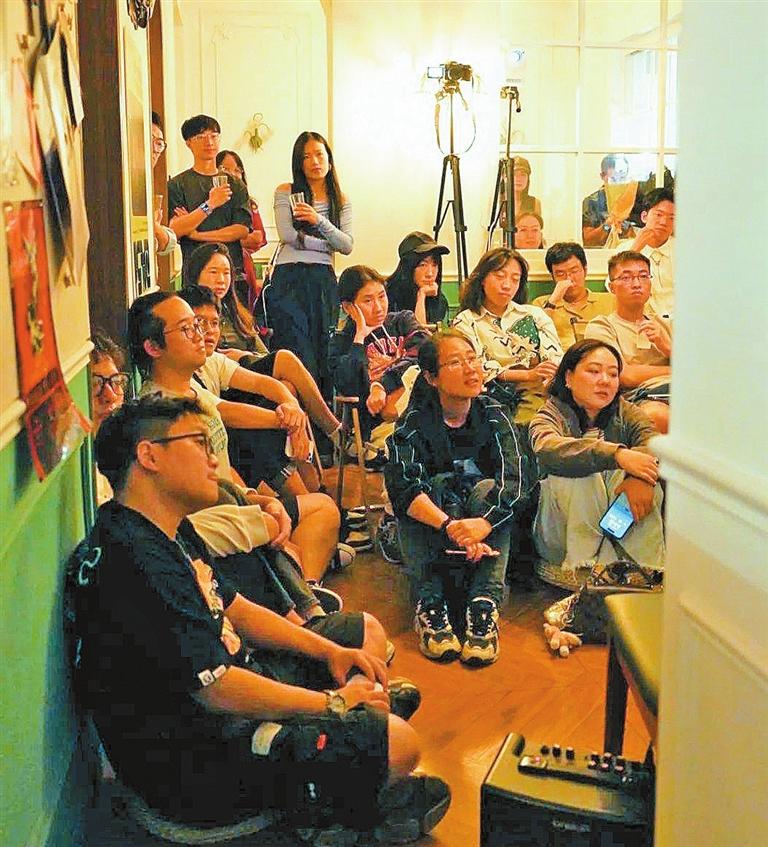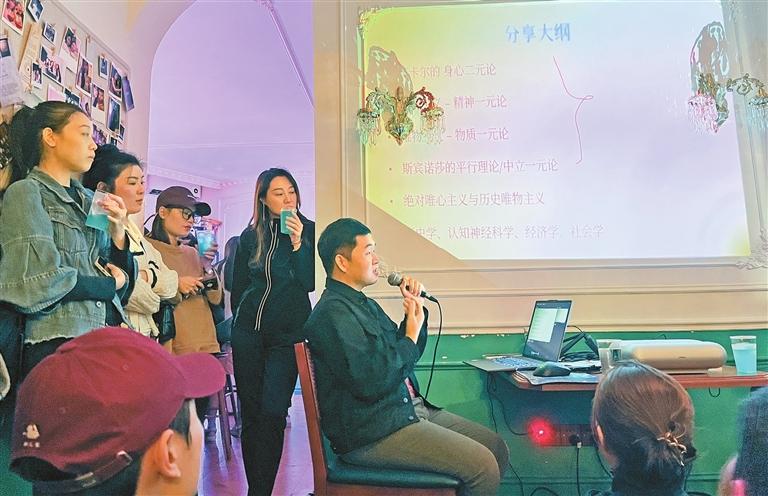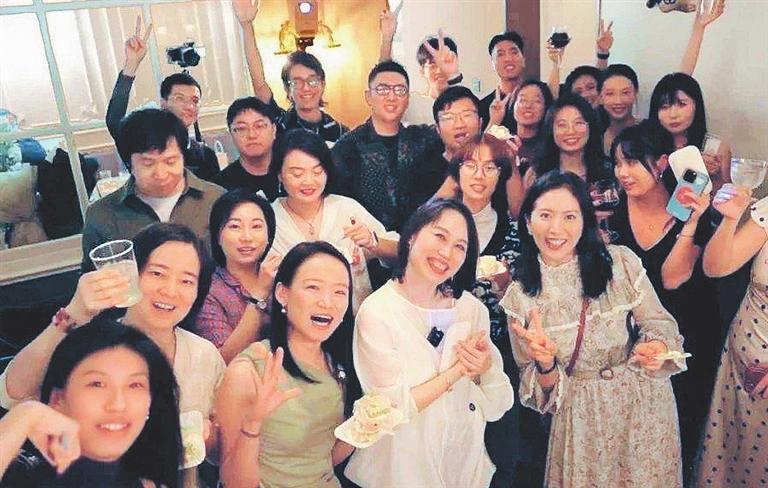




Zhang Yu JeniZhang13@163.com IMAGINE a scene where a diverse group of people, some seated and others standing, gather in the cozy atmosphere of a bar. Drinks in hand, they’re perhaps a little more at ease than when they arrived, all intently focused on a knowledgeable host sharing insights on an interesting topic, with a few slides projected on a screen. This is a growing trend in major Chinese cities — a blend of knowledge and social interaction that’s drawing in young people. These venues, aptly referred to as “academic bars,” offer a unique experience where intellectual curiosity meets conviviality. The trend, which pairs academia with libations, first took root in Beijing and Shanghai before finding its groove in Shenzhen. Leading this movement in Shenzhen is Neighbor House, a bar in Shekou, Nanshan District, which proudly claims to be the city’s pioneer of academic bars. A chance encounter On Sept. 27, Neighbor House hosted its first academic bar event, exploring the existential question “Is life a wilderness or a track?” The evening’s host was Zhou Yuzhi, a University of California, Irvine graduate who majored in philosophy and music. “The response was overwhelming. The bar was packed,” Kevin Yu, a bar partner of Neighbor House, told Shenzhen Daily. Reflecting on that memorable night, he was still amazed by the turnout. Following the event, Yu’s post on his WeChat video channel became the cherry on top, garnering nearly 7,000 likes and 18,000 shares. The video went viral, catapulting “Shenzhen’s first academic bar” into the spotlight. But how did it all begin? It started with a chance encounter — a post on Xiaohongshu a few months ago — and a shared vision. Meng Xianglong, known as Lao Meng, the founder of Neighbor House, was looking for event planning partners. Yu, a new media entrepreneur who moved to Shenzhen last March, stumbled upon Meng’s post and recognized an opportunity for partnership. Their connection was immediate, built on a mutual passion for organizing events that bring people together. Observing the growing buzz around academic bars in Shanghai and mounting inquiries from netizens about similar venues in Shenzhen, they sensed a burgeoning opportunity. More than a watering hole As daylight fades and the city lights up, inquisitive minds converge at academic bars to experience a different kind of night out. Attendees don’t just seek drinks — they crave intellectual enrichment while relishing the social aspects of a bar, where networking takes on a more meaningful form. Huang Xiaolin, a white-collar worker in her 20s, arrived at Neighbor House early Sunday evening to secure a front row seat. The philosophy lecture for the night, exploring the dichotomy of materialism and idealism, was once again given by Zhou. “I was here when the first event was held and I really enjoyed the lively discussions. It was quite a novel experience for me, and at the same time I could learn something,” Huang said. For Yu and Meng, Neighbor House is not just a watering hole. Instead, they believe it’s a place where the lines between leisure and learning, socializing and sophistication, are blurred in the most delightful of ways. According to Yu, many young people are on a quest to explore new avenues in life. At this crossroads, there’s a shared aspiration for enlightenment — a desire for answers or perhaps a spark of inspiration from varying viewpoints. “We are addressing this very need, offering a tapestry of disciplinary insights. You’ll discover that philosophy approaches questions in one manner, while economics may offer a completely different lens. We provide a catalyst for your thoughts,” Yu said. Meng added that this new experience offers a fresh perspective that might have eluded us in our daily routine, where our life follows a predictable path between home and work. “On a Wednesday evening, you found yourself in a bar engaging in conversations with individuals entirely outside your usual social and professional circles. This detour from your regular habits has the power to disrupt your established lifestyle and challenge your conventional thought patterns, introducing an array of new viewpoints,” Meng said. According to Yu, the events at Neighbor House are categorized into four primary areas — knowledge sharing, drama and film, live music, and entrepreneurship. Each category is designed to cater to a diverse range of interests and foster a community of learning, creativity, and collaboration. Diversified offerings to ignite minds After the success of their first event at the end of September, the small bar began to hold events on a regular basis. On Oct. 4, they invited actress Lin Xin to grace the stage and lead an evening of theatrical exploration. Two days later, the venue hosted a special music salon with the acclaimed Chinese classical guitarist Guan Cang. Zhou, reflecting on the overwhelming reception of their first event, likened it to a bustling subway station during peak hours, teeming with enthusiastic participants. “It’s like the subway station at 8 or 9 o’clock in the morning, crowded with people,” he told Shenzhen Daily. Zhou owns a studio and is a full-time speaker. According to him, he has spoken at some 200 music and philosophy salons in Shenzhen. Most of the time, he is dedicated to promoting music appreciation and aesthetic education. He said that bars, with their casual and convivial atmosphere, hold a natural advantage in bringing people together socially. Within the bar’s relaxed environment, interactions are not limited to the host and the audience — they also encompass spontaneous social exchanges among patrons. “I think the surge of academic bars reflects a profound and universal thirst for knowledge, culture, and the opportunity to engage with others in meaningful ways,” Zhou said. Neighbor House is not the only bar in Shenzhen that has jumped on the bandwagon. GO homebar in Futian District hosted a lecture about economics Nov. 9. OUTPOST, another bar in Futian, presented a lecture on the “social clock” concept Nov. 17. A flash in the pan? Is the “academic bar” trend just a fad or is it a revolution in socializing that’s here to stay? As academic bars amass more attention, a smattering of criticism has emerged online. Critics argue that mingling scholarly discourse with the bar scene may dilute academic rigor, while others label it a pure gimmick. In response, Yu said there is no need to overdefine or exaggerate the concept of academic bars. “What’s wrong with gaining some inspiration while drinking or simply drinking without listening?” Both Yu and Meng agree that the term “academic bar” may come and go with the ebb and flow of trends, but the essence of what Neighbor House offers will remain steadfast. The core philosophy — enriching the bar experience with activities and content — will continue to be its guiding principle. “We’ve reached a stage in our urban development where such spaces are not only necessary but inevitable. They are a natural outcome of our evolving need for community and connection in an increasingly urbanized world,” Zhou said. The founder of OUTPOST echoed similar sentiments, noting that while they don’t explicitly brand themselves as an “academic bar,” the value lies in inspiring and enlightening audiences through shared knowledge. | 
